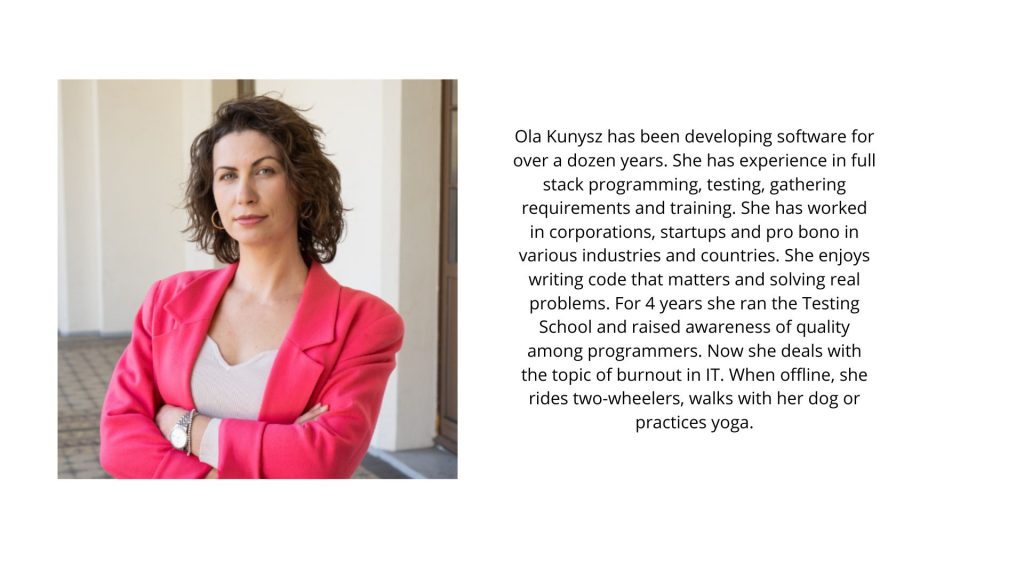Table of Contents

The average Polish employee spends an average of 1830 hours at work per year, placing Poland at the forefront among European countries in this respect. Work is, therefore, a significant part of our lives and significantly influences our daily routines. When work brings satisfaction and recognition, it can become a strong driving force for action. However, things take a downturn when motivation and enthusiasm are hard to come by, and the workplace triggers growing reluctance towards duties or coworkers. In such cases, the path to professional burnout is short. IT industry professionals, often working under time pressure and with the constant need to update their knowledge, are particularly vulnerable to this, as confirmed by research: in 2022, over 70% of IT employees admitted to struggling with professional burnout.
The scale of the problem is enormous, posing a serious challenge for managers and leaders. Therefore, we asked for insights on how to support employees and effectively prevent professional burnout within a team from an experienced mentor specializing in this area – Aleksandra Kunysz. Let’s see what conclusions we reached together!
Professional burnout – what is it and who does it affect?
Professional burnout has been included in the International Classification of Diseases (ICD) since 2019, and as of January 1, 2022, it has been recognized in Poland as an occupational syndrome. Since then, awareness of this problem has been gradually growing among companies and employees.
Professional burnout is a progressive process characterized by emotional exhaustion, a sense of constant fatigue and increasing tension, which often leads to reluctance, resignation, questioning one’s own competencies, and eventually complete loss of motivation and professional satisfaction.
Although it might seem that professional burnout is a problem mainly affecting people with long work experience, often employed for many years in one place, the reality is quite different. In practice, burnout can affect anyone who is professionally active – regardless of age, gender, profession, or length of employment. This disease has become a real plague even among young people at the beginning of their careers. Similarly, office workers, medical professionals, and IT industry specialists are vulnerable to it. This clearly shows that this problem should not be underestimated.
Causes of employee discomfort in the team due to burnout syndrome
Professional burnout is a disease that can have many sources. It often turns out to be a consequence of work overload, fatigue, and intense, chronic stress resulting, for example, from continuous work under time pressure. The reasons may also include issues within the team – lack of support from the leader, tense relations with coworkers, unclear division of responsibilities, or a conflict of values in the company are aspects that can not only ruin the organizational culture but also become factors of professional burnout among employees.
Consequences of professional burnout among team members
Professional burnout can have serious consequences that often negatively affect the entire team. Among them, the following should be noted:
- Decreased motivation and commitment, leading to lower efficiency and quality of tasks performed,
- Increased risk of making mistakes,
- Health problems (frequent headaches, insomnia, digestive problems, weakened immunity),
- Increasing conflicts within the team, impaired communication,
- In extreme cases, prolonged burnout can lead to depressive states.
How to recognize burnout in a remote employee?
In the era of ubiquitous remote work, identifying burnout among employees becomes an additional challenge for managers. Burnout is a complex process, a condition that develops gradually, making its initial symptoms easy to dismiss as ordinary fatigue. Meanwhile, frequent alarming signals that should alert both the employee and their supervisor include:
- Feeling of lack of energy, emotional exhaustion, which can manifest itself in an increased number of errors on the specialist’s side,
- Visible change in attitude towards work, a cynical approach to duties manifested by a lack of commitment,
- Lack of motivation, reluctance to take own initiatives or new projects,
- Concentration problems resulting in lower efficiency.
Risk factors for professional burnout in IT specialists
Working in the IT industry is a dream for many people. This sector is often perceived from the perspective of high earnings and wide development prospects, which should unequivocally lead to satisfaction. However, surprisingly, high pay alone cannot build well-being, and a well-paid programmer does not always mean a satisfied employee.
Contrary to appearances, professional burnout is an increasingly common problem among people working in the IT industry. To understand the reasons for this situation, it is easier to analyze the specifics of work in this sector. Strong stress associated with the timely implementation of projects and constant pressure to deliver results is the daily reality that many specialists complain about.
Working under such conditions for a long time obviously leads to a disruption of the balance between private and professional life, which is particularly noticeable in the case of remote teams – and as we know, this is not uncommon in the industry. When inadequate support from superiors, ineffective communication, or a sense of underappreciation by leaders are added to this, the risk of burnout increases disproportionately.
Remote work – are remote employees mainly at risk?
According to CNBC data, as many as 69% of remote workers experience professional burnout. Full remote work has many advantages, but the risk of burnout is undoubtedly one of the biggest disadvantages of remote work.
The connection between remote work and professional burnout stems from several factors. In addition to the difficulty in maintaining a proper work-life balance, remote work and the lack of direct contact with the team can also result in difficult communication, loosening of relationships, and ultimately, a sense of isolation and lack of belonging to the organization.
Among specialists working remotely, there is also an increasingly common phenomenon of so-called “zoom fatigue“, i.e., fatigue and the inability to maintain attention, resulting from prolonged participation in video conferences. Working from home is also associated with a certain monotony of daily life, which can also exacerbate feelings of burnout.
How to deal with it? Manager’s ways to prevent IT professional burnout
To effectively prevent professional burnout, greater awareness of the problem is necessary among both employees and, above all, management and leaders. This requires not only a change in thinking but also the implementation of appropriate solutions tailored to the needs of modern employees.
Consider renting an office or coworking space
Although remote work is desirable for many people, continuous work from home can be a cause of professional burnout in the long run. In such conditions, it is easy to blur the boundaries between personal and professional life. As our expert, Aleksandra Kunysz, emphasizes:
Most of us do not have a specially designated office space at home with an ergonomic workstation. Working at the kitchen table or a desk in the bedroom, where the work computer is always within reach, many people find it difficult to clearly define working hours, feeling tempted to immediately check emails or complete assigned tasks, even if they appear in the inbox outside of working hours. Sometimes, this can also work the other way around when work tasks begin to intertwine with household responsibilities, blurring the line between effective work and break time. Without good organization of work tasks and family responsibilities, maintaining balance will be impossible.
This means that remote workers also need a specifically designated space where they can focus and be productive, knowing they start and finish at specific hours, after which they can return home, disconnect from work, and simply relax. If the company operates remotely daily and does not have its own office, then coworking spaces for companies are an ideal solution. At Idea Place, we provide renting office spaces for teams, which can be used flexibly, adapting the service to individual needs.
Organize team meetings
Among remote employees, a common issue is a feeling of loneliness and isolation, which leads specialists to not feel a sense of belonging to the company, be less loyal, or feel left to their own devices. To prevent this, it’s worth implementing regular team meetings, which are crucial for efficient communication and building lasting relationships among employees, ultimately affecting the overall work atmosphere.
Organize workshops and training for soft skills development
In the IT industry, there is rarely any focus on developing soft skills, as can be seen by analyzing job offers, where the list of technical skills significantly outweighs the requirements for soft skills. However, individuals with underdeveloped soft skills, who struggle with communication, are more vulnerable to professional burnout. They may feel alienated and experience unnecessary conflicts arising from misunderstandings.
This all means that managers aiming to prevent professional burnout in their teams should also focus on developing employees through workshops and training in soft skills such as effective communication, time management, and stress management.
Provide regular breaks
Studies show that it’s not possible to work at full mental capacity for 8, or even 6, hours straight. As emphasized by Aleksandra Kunysz, expecting employees to work at 100% of their capacity for a long time is a simple recipe for the professional burnout of the entire team.
It happens that a person who works excessively is incredibly efficient, but gradually, driven by the results of their work, they become more and more drained, eventually feeling overwhelmed and completely drained of energy. Unfortunately, this is a common scenario in cases of professional burnout, so work should be interspersed with moments of rest, preferably away from the computer screen.
Resting is not a waste of time, but a way to recharge your batteries before facing new challenges. All employees need regular breaks, including managers. Making many difficult decisions, often under time pressure, is hard work for the brain. It is also important to remember that example comes from the top, and employees observe their leaders. Therefore, it’s worth setting a good example
– says Aleksandra Kunysz, who observes these problems daily while working with IT managers.
Delegate tasks and clearly define their goals
An important problem that can contribute to professional burnout among employees is setting unrealistic expectations for them. Unrealistic goals or inadequate requirements can lead to frustration, a lack of belief in one’s own abilities, and a gradual decrease in job satisfaction.
This is particularly problematic for managers who tend to take on too many responsibilities at once. In this context, the key is the ability to efficiently delegate tasks and use the support of the team.
Personal development as a way to prevent professional burnout
The lack of opportunities for development is another issue that is often raised in the context of professional burnout. The feeling of stagnation, without the opportunity to develop one’s own skills, can be a significant factor leading to job dissatisfaction and growing reluctance. Acquiring new skills through participation in courses and training is an important motivator for action and the gradual development of one’s career.
How to avoid work overload for IT experts?
The high demand for IT services means that deadlines for yesterday and a constant pursuit of deadlines are the unpleasant daily reality for many companies. A kind of efficiency cult, coupled with high competition and a sense of permanent rivalry, poses a serious threat to employees who – without proper support – may fall into stagnation, gradually burning out. How to avoid this?
Ensure a good work atmosphere
The overall atmosphere in the company and the relationships within the team are factors that significantly affect the efficiency of employees and their satisfaction with their work. In this respect, the role of the manager is invaluable – they unite the team, taking care of the organizational culture and values.
Provide access to support
More and more modern organizations, aware of how important employee well-being is for their efficiency, provide them with access to a psychotherapist, organize training in mental health care, or support initiatives promoting this issue. Year by year, awareness is also growing among employees, who pay increasing attention to such benefits, appreciating companies showing their own initiative in this area. This is accompanied by the need to build teams led by properly educated managers who can cope with stressful situations.
Provide employees with autonomy
One of the pillars of professional burnout is gradual depersonalization. How does it manifest? As Aleksandra Kunysz explains:
It’s emotional distance from the team and less involvement in the project, which can manifest itself in cynicism. I often ask my clients about this, wondering what happened that a fully committed and enthusiastically oriented employee suddenly becomes a cynical complainer. It turns out that this change often stems from a lack of a sense of influence. If proposed solutions are constantly ignored, attempts to implement improvements come to nothing, and responses to requests are just empty promises, it’s easy to lose engagement. Micromanagement is often a problem, when employees hired as experts are simultaneously deprived of autonomy. In this case, such an employee no longer knows whether their role is to create high-quality software or to meet the demands of their supervisor. There is a risk of a conflict of values. Persisting in this state for a long time will cause stress, inevitably leading to burnout.
An employee after professional burnout – how to facilitate their return to work?
Sometimes, professional burnout intensifies to such an extent that the only solution is a longer break from work, in the form of a vacation or – in more serious cases – sick leave. The goal is always rest and providing space to recharge calmly.
If the company has experience related to an employee’s professional burnout, it’s worth taking the time to implement procedures and a conscious policy to prevent such situations in the future. Creating a friendly work environment is also necessary for the employee to return to work without any concerns, using the regained energy to effectively tackle new challenges. In this context, it’s essential to properly prepare leaders and equip them with the tools necessary to effectively manage the team and stimulate motivation.
Working in IT and the necessary support from leaders
As a manager, you are not only a leader but also a kind of mentor and significant support for your team. How you act and communicate with employees affects their efficiency and well-being in the workplace.
In the IT industry, there are sometimes situations where excessive focus on technical issues completely overshadows soft skills and their importance for effective team management. Hence, the problem of undervaluing employees (also – or perhaps especially – non-financially) or setting them too high or unclear requirements. If we do not properly take care of this area, all of this can ultimately lead to professional burnout.




